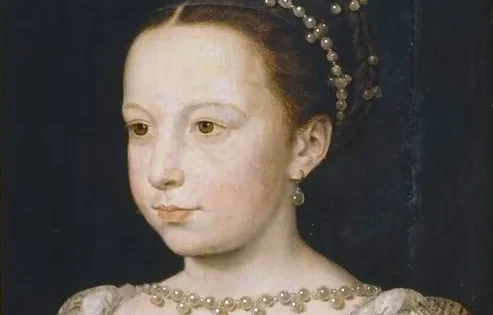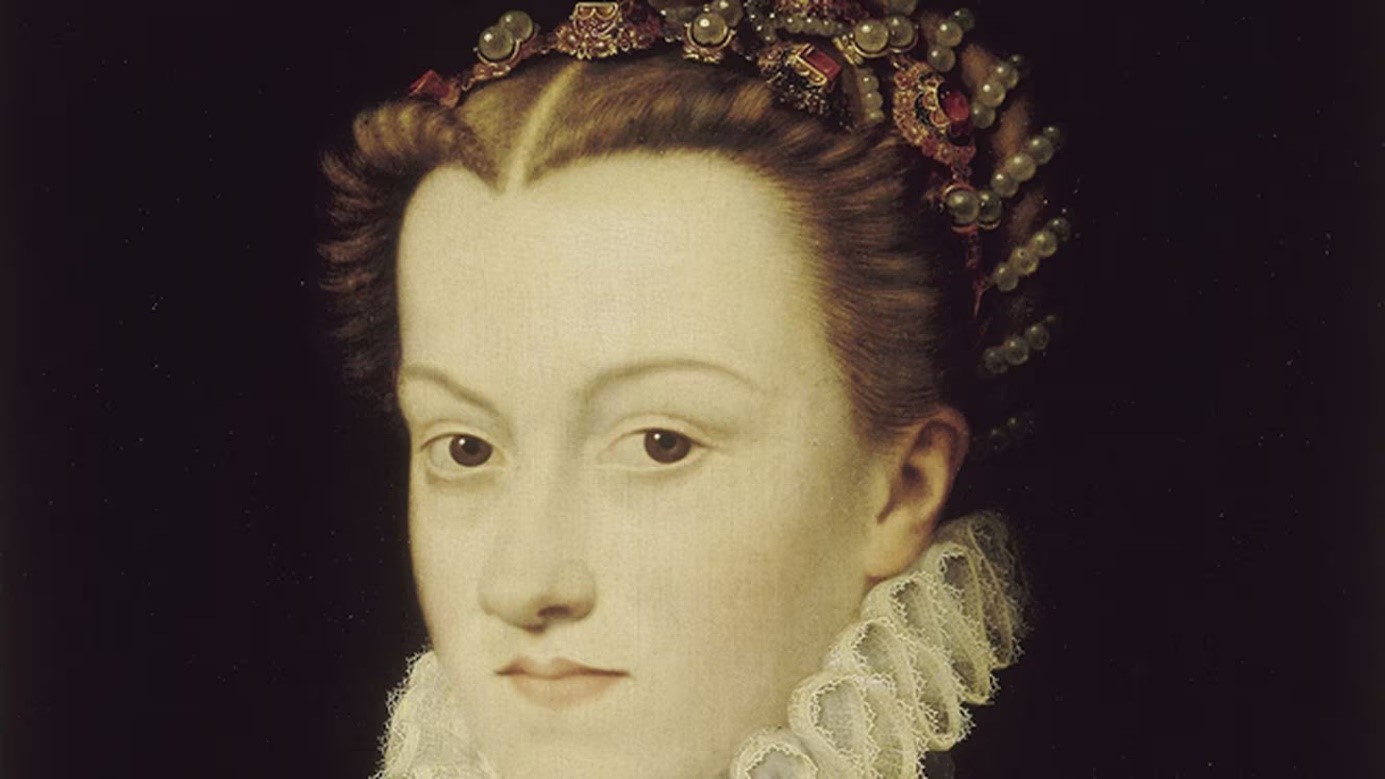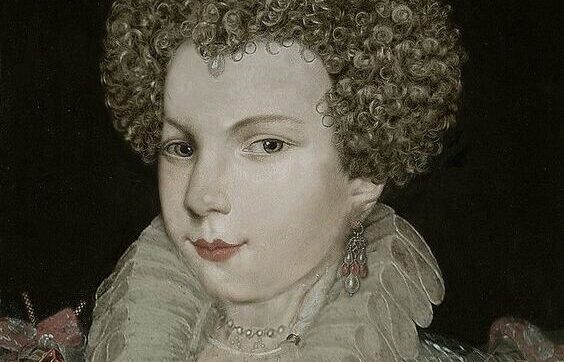By Carmen Chang,
While isolated at the Castle of Usson in 1594, Marguerite de Valois embarked on the project of writing her Memoirs, which would not be published until 1628, thirteen years after her death. This memoirist text recounts certain periods that the writer wanted to focus on, to immortalize them. The reading of these Memoirs shows that the writer deliberately wanted to show that, throughout her life, she went through events that marked her, and she is keen to leave traces of these for posterity. An astute reader will notice that her selective biography reveals an evolution of her character. In the following discussion, we will try to highlight this evolution, which is particularly noticeable in her relationships with those around her, especially her brother, her mother, and her husband.
Marguerite chooses to begin these Memoirs with a period close to her, at the time she starts this project. She excludes from her Memoirs her childhood, a period of innocence and lack of reason, as during childhood, “men are guided by nature, like plants and animals, rather than by Reason“. She also omits her youth because she was “so young at that time that I could only remember it in broad terms, the details having faded from my memory like a dream“. Consequently, the writer conscientiously focuses on the points she remembers in detail, with a concern for accuracy and realism. She admits that her past was one of carefreeness, frivolity, and disinterest, “looking disdainfully at the past at the activities of my childhood, dance, hunting, and the company of my age, despising them as too foolish and vain“. She confesses to having engaged in activities during her childhood that she abhors at the time of writing the Memoirs, which gives her text a tone of maturity and wisdom. This evolution signals to the reader that these are not the confessions of an old woman, but a deliberate choice by the writer to inform that she has put her past behind her and relates events with clarity. She can analyze events with proper judgment. The dilemma she finds herself in shows that she can measure the extent of her situation and that she has left the frivolity of youth to enter a period that requires more discernment, “the Huguenots considered me suspect because I was Catholic, and the Catholics because I married the King of Navarre“. Throughout her biography, she will show that she tries, whether in Paris or Gascony, to ease the hostilities between her husband’s clan and her family, between the Catholics and the Huguenots. She plays a crucial role in bridging the gap between the two factions (the Catholics and the Huguenots) and establishing peace among the warring parties. Although she married a Huguenot and the king suspected her loyalty, her move to Gascony and her new life as the wife of the King of Navarre did not fuel her hatred or turn her against her family. She acts as a rational and mature woman.

Marguerite’s remarkable evolution is particularly evident in her relationships with the members of the royal family. During the years covered by her Memoirs (1569-1571), her brother Anjou asked the Queen Mother to no longer inform her about state affairs, because she was to marry a Huguenot, Monsieur de Guise. Being Catholics, he feared that his sister might transmit secrets to her Huguenot husband, “it would be good if she no longer spoke to me about affairs and gradually withdrew from familiarizing with me“. The king went so far as to take her hostage to prevent her from alerting her Huguenot husband about state affairs. This captivity put her brother, who was in Champagne and ready to declare war for her, in a difficult position. “If he did not have the affection for his homeland as deeply rooted in his heart as he did, he would have waged a cruel war“. Marguerite is the point of discord between the king and her brother, who demands that she be released immediately from house arrest. Shortly after, it is she whom the king will send to her brother to calm the hostilities between the enemy brothers because her brother “had more faith in [her] than in anyone else“.
Marguerite appears as a woman who does not seek to harm her brothers; on the contrary, she suffers unjust wrongs, especially from the king. The plots targeting her stem from the king’s court’s slanders. If the king perceived that his throne was in danger, he would stop at nothing to protect himself, even if it involved his brother and sister. Marguerite de Valois presents herself as someone seeking to bring her brothers closer together rather than fuel their animosity. “I told him that I did not prefer my personal good to the good of my brothers and this State, for whose peace and contentment I would like to sacrifice myself“. Later, she will be repaid for her actions by helping her brother, who was placed under house arrest by the king because the latter suspected him of plotting against him. She will help him escape from his second-floor room, using a cable she secretly brought. The strong relationship she has with her brother leads him to ask the king to poison them together because he knows that “she loves me so much that she would prefer to be captive with [me] rather than live free without [me]“. This sibling love is so intense that she risks her life, as, if she were denounced for complicity in her brother’s escape from the castle, she would face severe sanctions from the king. Consequently, her relationship with her brothers is marked by interest when it comes to the king, “the inexperienced one“, and by love when it concerns the King of Flanders, of whom she says, “my brother whom I cherished more than myself“.
Her relationship with her husband also shows an evolution. Initially, the king perceives this marriage as tainted because her husband is a Huguenot, while the entire family is Catholic, even demanding that he convert to Catholicism if he wants to have her, “if the king my husband wanted to have me, he should become Catholic“. The evolution of her relationship with her husband, Monsieur de Guise, becomes apparent when war is declared against the Huguenots. Marguerite finds herself in an embarrassing situation. It would be inappropriate for her to remain in a castle that declares war on her husband, “and taking advice from the Court, my friends, and acquaintances, they represent that it would be unbecoming for me to remain in a Court so hostile to the king my husband and from where war is so openly waged“. Her dilemma lies between family duty and conjugal duty. Both the king and her husband would suspect her of supporting the opposing camp, which is discomforting for her. Her decision to leave for a spa treatment in Spa serves as an alibi to escape the suspicions surrounding her. Her request to join her husband in Gascony is made only after the war ends and peace is established. Once by her husband’s side, she does not abdicate or renounce her religion. On the contrary, she continues to practice her religious duties and even requests the release of some Catholics detained for attending Huguenot services, which was forbidden. She believes in religious diversity, adapting to this new situation she lives in Flanders, where it is about two non-antithetical religions that can coexist, “But there was no talk of this diversity of religion; the king my husband and Madame the princess his sister going to the sermon on one side, and I and my retinue to mass in a chapel in the park“.

Her status as the wife of the King of Flanders grants her prerogatives she did not enjoy when she was with her family. She transitions from a princess under suspicion, using all means to escape her brother the king’s ire, to a queen endowed with power and authority. She will try to do everything in her power to stop the war between her husband and her brother.
Although her husband’s marital troubles offend her, she behaves rationally, seeking to conceal his openly displayed extramarital affair. She moves into a castle, where her husband has impregnated his mistress. At her husband’s request, she seeks out the mistress and tries to care for her, despite the latter’s attempts to tarnish her image with her husband.
Marguerite de Valois’ Memoirs represent sequences from the life of a queen who, “having had too much experience“, seeks to present herself as a woman forged by various experiences. The evolution of her character is particularly noticeable in the image she seeks to portray. It is the image of a seasoned, rational, and benevolent woman. This is the representation every memoirist seeks to reflect. Marguerite de Valois aims to impress her reader through this evolving representation of herself as a wise and seasoned woman.
Reference
- Marguerite de Valois. Mémoires et discours. PU: Saint-Etienne. Saint-Etienne. 2004.




